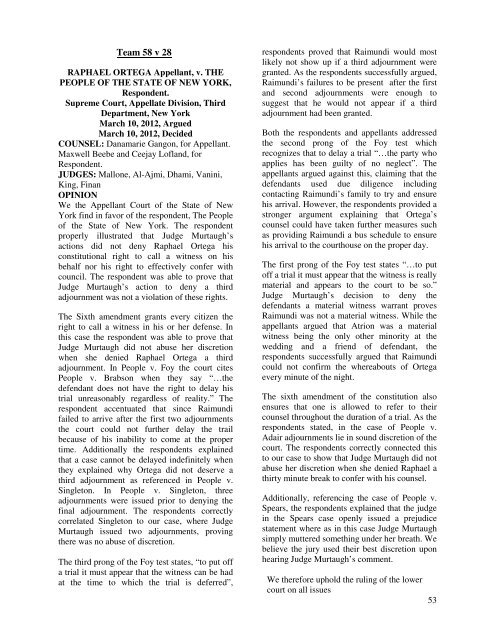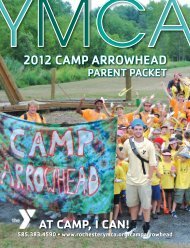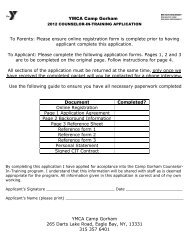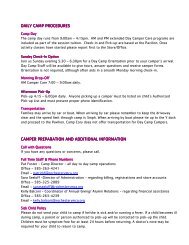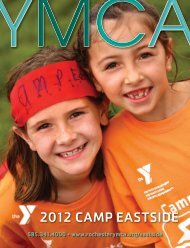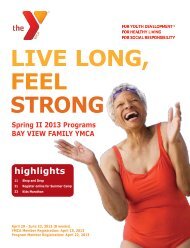2012 Conference Executive Record Report.pdf - YMCA of Greater ...
2012 Conference Executive Record Report.pdf - YMCA of Greater ...
2012 Conference Executive Record Report.pdf - YMCA of Greater ...
You also want an ePaper? Increase the reach of your titles
YUMPU automatically turns print PDFs into web optimized ePapers that Google loves.
Team 58 v 28<br />
RAPHAEL ORTEGA Appellant, v. THE<br />
PEOPLE OF THE STATE OF NEW YORK,<br />
Respondent.<br />
Supreme Court, Appellate Division, Third<br />
Department, New York<br />
March 10, <strong>2012</strong>, Argued<br />
March 10, <strong>2012</strong>, Decided<br />
COUNSEL: Danamarie Gangon, for Appellant.<br />
Maxwell Beebe and Ceejay L<strong>of</strong>land, for<br />
Respondent.<br />
JUDGES: Mallone, Al-Ajmi, Dhami, Vanini,<br />
King, Finan<br />
OPINION<br />
We the Appellant Court <strong>of</strong> the State <strong>of</strong> New<br />
York find in favor <strong>of</strong> the respondent, The People<br />
<strong>of</strong> the State <strong>of</strong> New York. The respondent<br />
properly illustrated that Judge Murtaugh’s<br />
actions did not deny Raphael Ortega his<br />
constitutional right to call a witness on his<br />
behalf nor his right to effectively confer with<br />
council. The respondent was able to prove that<br />
Judge Murtaugh’s action to deny a third<br />
adjournment was not a violation <strong>of</strong> these rights.<br />
The Sixth amendment grants every citizen the<br />
right to call a witness in his or her defense. In<br />
this case the respondent was able to prove that<br />
Judge Murtaugh did not abuse her discretion<br />
when she denied Raphael Ortega a third<br />
adjournment. In People v. Foy the court cites<br />
People v. Brabson when they say “…the<br />
defendant does not have the right to delay his<br />
trial unreasonably regardless <strong>of</strong> reality.” The<br />
respondent accentuated that since Raimundi<br />
failed to arrive after the first two adjournments<br />
the court could not further delay the trail<br />
because <strong>of</strong> his inability to come at the proper<br />
time. Additionally the respondents explained<br />
that a case cannot be delayed indefinitely when<br />
they explained why Ortega did not deserve a<br />
third adjournment as referenced in People v.<br />
Singleton. In People v. Singleton, three<br />
adjournments were issued prior to denying the<br />
final adjournment. The respondents correctly<br />
correlated Singleton to our case, where Judge<br />
Murtaugh issued two adjournments, proving<br />
there was no abuse <strong>of</strong> discretion.<br />
The third prong <strong>of</strong> the Foy test states, “to put <strong>of</strong>f<br />
a trial it must appear that the witness can be had<br />
at the time to which the trial is deferred”,<br />
respondents proved that Raimundi would most<br />
likely not show up if a third adjournment were<br />
granted. As the respondents successfully argued,<br />
Raimundi’s failures to be present after the first<br />
and second adjournments were enough to<br />
suggest that he would not appear if a third<br />
adjournment had been granted.<br />
Both the respondents and appellants addressed<br />
the second prong <strong>of</strong> the Foy test which<br />
recognizes that to delay a trial “…the party who<br />
applies has been guilty <strong>of</strong> no neglect”. The<br />
appellants argued against this, claiming that the<br />
defendants used due diligence including<br />
contacting Raimundi’s family to try and ensure<br />
his arrival. However, the respondents provided a<br />
stronger argument explaining that Ortega’s<br />
counsel could have taken further measures such<br />
as providing Raimundi a bus schedule to ensure<br />
his arrival to the courthouse on the proper day.<br />
The first prong <strong>of</strong> the Foy test states “…to put<br />
<strong>of</strong>f a trial it must appear that the witness is really<br />
material and appears to the court to be so.”<br />
Judge Murtaugh’s decision to deny the<br />
defendants a material witness warrant proves<br />
Raimundi was not a material witness. While the<br />
appellants argued that Atrion was a material<br />
witness being the only other minority at the<br />
wedding and a friend <strong>of</strong> defendant, the<br />
respondents successfully argued that Raimundi<br />
could not confirm the whereabouts <strong>of</strong> Ortega<br />
every minute <strong>of</strong> the night.<br />
The sixth amendment <strong>of</strong> the constitution also<br />
ensures that one is allowed to refer to their<br />
counsel throughout the duration <strong>of</strong> a trial. As the<br />
respondents stated, in the case <strong>of</strong> People v.<br />
Adair adjournments lie in sound discretion <strong>of</strong> the<br />
court. The respondents correctly connected this<br />
to our case to show that Judge Murtaugh did not<br />
abuse her discretion when she denied Raphael a<br />
thirty minute break to confer with his counsel.<br />
Additionally, referencing the case <strong>of</strong> People v.<br />
Spears, the respondents explained that the judge<br />
in the Spears case openly issued a prejudice<br />
statement where as in this case Judge Murtaugh<br />
simply muttered something under her breath. We<br />
believe the jury used their best discretion upon<br />
hearing Judge Murtaugh’s comment.<br />
We therefore uphold the ruling <strong>of</strong> the lower<br />
court on all issues<br />
53


